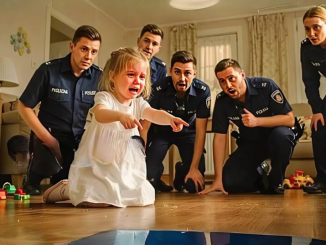He was just supposed to read a story.
Officer Lane had done a few school visits before—standard stuff. Shake hands, smile for a photo, read a book about safety or puppies or crossing the street. This time, it was Officer Buckle and Gloria, and he even practiced the funny voices in the car on the way over.
The kids were giggling, totally locked in.
Until a tiny hand shot up in the middle of the page.
“Do you have to be nice to bad guys too?” the little voice asked.
The whole room went quiet.
Lane paused. Closed the book.
And instead of brushing it off or giving the textbook answer, he knelt a little lower and said, “Sometimes, the people we call ‘bad guys’ are just people having the worst day of their life.”
Another hand went up.
“My daddy got taken by a police. Is he a bad guy?”
Lane looked that boy straight in the eye and said, “Your daddy made a mistake. But mistakes don’t make someone bad. What we do next… that’s what matters.”
The teachers stood still in the back of the room, some biting their lips. One even wiped her cheek.
He never finished the book.
But when he stood up to leave, half the class ran to hug him. And one of them—quiet, serious, always shy—slipped him a crayon drawing that said: Thank you for being a gentle helper.
He still keeps it in his patrol car.
The visit should’ve been like any other. A quick read, some questions, a handshake, and then back to his patrol car to deal with the next call. But that little moment with the child had lingered with Officer Lane long after he left the school that day.
The question had been simple, but its impact was profound: “Do you have to be nice to bad guys too?”
He’d expected the usual questions about how many bad guys he caught, or if he had ever been scared on the job. But this? This was different. It cut deeper than he ever anticipated. And what followed—answering the question about a little boy’s father, taken away by the police—was something Lane would never forget.
As he drove home that afternoon, he thought about the boy. What was life like for him at home? Was there love and comfort waiting for him after the police took his father? Or was there anger, confusion, or fear?
The more Lane thought about it, the more he realized that the world of law enforcement wasn’t as black and white as he had once thought. It wasn’t just about enforcing laws and catching criminals. It was about understanding people—their stories, their struggles—and sometimes, offering them a bit of compassion. He had always tried to be a fair officer, but that day, he realized he could do more. He could be more than just an enforcer of the law; he could be a force for understanding and healing.
In the weeks that followed, Lane began to see his job through a different lens. He still made arrests and dealt with dangerous situations, but now he made a conscious effort to understand the reasons behind the actions of those he interacted with. It wasn’t easy—there were still plenty of difficult days, angry people, and situations that pushed him to his limits. But he started to view his role as more than just “catching the bad guys.” He saw himself as someone who could be a bridge, someone who could offer a second chance to those who were ready to turn their lives around.
One day, a few months later, Lane was called to a domestic disturbance at a local apartment complex. When he arrived, a woman was standing outside, her face red from crying. A man—late 20s, rough around the edges—was sitting on the curb with his hands cuffed behind his back.
It was the same man who Lane had arrested several times before. His name was Jared, and every time Lane saw him, it was always the same story—drugs, fights, or theft. Lane had never seen any sign of hope in Jared, just a cycle of anger and frustration.
But this time was different. As Lane walked up to the man, Jared looked up at him with a hollow expression, almost as if he’d given up.
“Lane,” Jared muttered, his voice shaky. “I didn’t do it this time. You’ve got to believe me. I didn’t hurt her. I don’t even know how it happened.”
Lane crouched down to Jared’s level, his voice soft. “Tell me what happened.”
The man explained between sobs, telling Lane about a fight he’d had with his girlfriend and how everything had escalated from there. Lane could tell Jared wasn’t lying. The anger and bitterness that had always surrounded him seemed to fade, replaced with something much deeper—regret. Jared had reached his breaking point.
Lane could have arrested him, could have taken him straight to jail, like he’d done so many times before. But this time, he didn’t. Instead, he spoke with Jared calmly, explaining that the system was there to help him, but only if he was willing to help himself. Lane offered him resources—counseling, rehabilitation, and even a job lead through a local outreach program.
“I’ll let them handle it from here,” Lane said, standing up. “But Jared, you need to make a decision. You can’t keep doing this.”
Jared just nodded, looking down at the ground.
Months passed after that day, and Lane didn’t expect much. He still saw Jared around town, often looking defeated or distant. But one day, out of the blue, Lane got a call. It was from Jared, and his voice was different this time—softer, more composed.
“Officer Lane,” Jared said, sounding almost like a man reborn. “I… I wanted to thank you. I’ve been clean for six months now. I got the job you told me about. And, I’m trying to rebuild. I just wanted you to know… you made a difference.”
Lane’s heart swelled. This was what he had hoped for. It wasn’t an easy journey, but hearing those words meant everything.
It wasn’t just about following the law; it was about showing people that they could change, that they could make better choices. Lane had done more than just enforce the law that day. He had offered hope, and that made all the difference.
A few weeks later, Officer Lane was back at the school for another visit, though this time, he wasn’t just there to read a book. He was there to talk about second chances—how everyone, no matter their past, deserves the opportunity to grow, to change, and to be better.
As he stood in front of the class, one hand raised to ask a question, a familiar, tiny voice piped up again.
“Do you have to be nice to bad guys too?”
Lane smiled, his heart full as he answered. “You don’t have to be nice to anyone who hurts you, but always remember that even the people who’ve made mistakes deserve a chance to do better. We all have that chance.”
The teacher gave him a knowing look, and some of the kids nodded. But Lane wasn’t done. He turned to the class and said, “In fact, the person I used to call a ‘bad guy’ is now one of my good friends. He’s working hard to make things right, and that’s what matters.”
He wasn’t sure if they fully understood the message yet, but he knew that someday, they would.
The karmic twist? The next week, Lane received an unexpected message from Jared—a simple “Thank you” with a picture attached. It was Jared, dressed in a clean uniform, standing behind a counter at a local business. He had turned his life around, and now he was paying it forward. He had started mentoring others who had fallen into the same traps he had.
Lane had helped Jared see that everyone can change, but it was up to the individual to take that first step. And now, Jared was helping others do the same.
It was the greatest reward he could have asked for.
The lesson: Sometimes, the smallest act of kindness can ripple out and change the lives of many. Whether you’re a police officer, a teacher, or just a friend, showing compassion can be the difference between someone staying stuck in their past or moving toward a brighter future.
If this story resonated with you, share it with others. You never know who might need a reminder that they can always choose a different path.






Leave a Reply